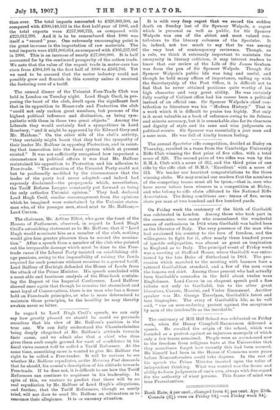The annual dinner of the Unionist Free-Trade Club was held
in London on Tuesday night. Lord Hugh Cecil, in pro- posing the toast of the club, dwelt upon the significant fact that in its opposition to Home-rule and Protection the club " could not only reckon great numbers, but persons of the highest political influence and distinction, as being sym- pathetic with them in those two great objects." Among the Liberals they would certainly find a sympathiser in Lord Rosebery, " and it might be approved by Sir Edward Grey and Mr. Haldane." On the other side of the club's activity, "they certainly might boast that they had the sympathy of their leader Mr. Balfour in opposing Protection, and in resist- ing that innovation into the fiscal system which at present existed." It was not sufficiently recognised how important a circumstance in political affairs it was that Mr. Balfour maintained his opposition to Protection and his adhesion to Free-trade. " The situation of the Unionist Party could not but be profoundly modified by the circumstance that the leader of the party had never adopted—and indeed had expressly disclaimed—the propaganda which, nevertheless, the Tariff Reform League constantly put forward as being the only orthodox Unionist opinion." They had, declared Lord Hugh Cecil, similar encouragement from the opinions which he imagined were entertained by the Unionist states- man who, of the younger men, stood next to Mr. Balfour,— Lord Curzon.






































 Previous page
Previous page